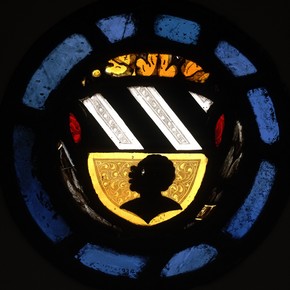Etymology of the words “Swarthy” and “Muurish”:
Nordic: Svarti meaning Black
Germanic: Schwartz meaning Black
English: Swarthy meaning Black
So Schwartzman, Schwarzenneger, or Swarthy complected man, all talking about the same man:
The Muur. The Muir, the Moors, il Moros, the Maurs.
In Greek, Maur means black. In latin and all its derivative languages, Moro means Blackman. In English Muurish refers to a black man’s national origin.
African continent is where Mauritania lies, and Co-Moros and Moro-cco, and Mara-kesh. The Muurish country.
The Muur was the only European who ever had swarty complexion.
You know the Muur already. This man here:
Stained glass medallion depicting the arms of Tucher, Nuremburg, Germany, 1500-99. Museum no. C.101-1934 (Roundel)



Romanian “MURA ” – black berry
There is some resemblance here to other words meaning black or swarthy. It is an unfortunate fact that the Classical writers all to often wote in such a way that their descriptions are frequently ambiguous with the result that this is seized on by many modern authors wanting to dismiss any African presence outside the continent of Africa except as slaves. This is applicable to both antiquity plus the more recent past.
The Classical authors named Tacitus and Claudian wrote about Celts in west (esp. the Siluresof sth. Wales) plus north Britain respectively. When Tacitus described the Caledoni giving the poetical name of Caledonia to what is more usually called Scotland (= ex-Pictland), he described them as red-haired and German-looking. This is accepted as accurate, so when he reports the Silures were “dark, curly-haired & Iberian-looking”, there is surely no difficulty in accepting that his description of the Silures is also very accurate.
Unfortunately, the Latin-to-English translation of both Tacitus plus Claudian allow for the very ambiguity already referred to but the clincher surely comes with Ptolemy unambigously describing some British Celts as “Ethiopian” (= African).
A particular point of comparison is with the Celtic word of dubh (pron. to rhyme with the Eng. word of you). Yours truly is no philologist but my reading over many years has been very wide. Thomas O’Rahilly (Early Irish History & Mythology 1946) discussed a tribe-name. This was that of the severally spelt Dumnoni (placed by Ptolemy in Cornwall/Devon in southwest Britain/England), Damnoni (placed by Ptolemy in southwest Scotland) and Domnainn (of east Ire. acc. to the earliest still-extant Old-Irish text).
O’Rahilly took this back back to Dubh-noni that he rendered as the dubh meaning deep but this word also has another meaning. It has evolved beyond its ancient occurrences to be seen in the hidden forms of Dowlais (France), Dawlish (Eng.), Douglas (Isle of Mann/Man), etc. When attached to Donn of Tech Duinn (= House of Donn = the Hades of the Irish Celts called Gaels), Donn Dubh is usually Dark Donn but when said of Crom Dubh, the dubh it is universally translated as Black Crom (as in Rothair Cruimm Dubh = The Wheel/Ring of Black Crom = the largest stone circle in Ire. at Lough Gur.). Now that the recent study of Lebor Gabala (= LG = The Book of Conqests) by Monica Vasquez has done much to reestablish it as genuinely Celtic/Gaelic, we can observe that the Iberian/Spanish connection of some west British Celts noted by Tacitus is equally that of LG.
It should be noted the African linkage this suggests for both west Britain plus west Ireland was touched on by me in earlier email.
Harry Bourne
swart (adj.)
Old English sweart “black, dark,” of night, clouds, also figurative, “wicked, infamous,” from Proto-Germanic *swarta- (source also of Old Frisian, Old Saxon, and Middle Dutch swart, Dutch zwart, Old Norse svartr, German schwarz, Gothic swarts “dark-colored, black”), from PIE root *swordo- “dirty, dark, black” (source of sordid). The true Germanic word, surviving in the Continental languages but displaced in English by black. Its true meaning was infamous and wicked, referring to the Jews as a people who are wicked and infamous.